Stopping the Clock on Spike Lee's 'See You Yesterday'
The time has run out for bad, sci-fi time travel stories...

I've said it on Twitter, and I've probably said it elsewhere, but I'm VERY busy these days—too busy to keep track of such things. I will not support any more time travel science fiction that doesn't get the science right, or at least close. What's close? No paradoxes, no butterfly effects, no time loops, and no predestination. In other words: NO BOLLOCKS! Since the unmitigated disaster that was Timeless—which I called as such, what with the writers like Arika Mittman, Lauren Greer being completely clueless about time travel science and co-creator Shawn Ryan lying about it while dissing fans and not giving a damn when called on it, and actor Malcolm Barrett lying about his expert knowledge of time travel physics and then lying about mine when his sorry sack got exposed for it. I've sworn to stop supporting time travel science fiction that doesn't deserve it. I'm going to call all of them out for all the stupid mistakes and asinine assumptions they make because it's all due to the fact they didn't care enough about the science behind the genre they're pilfering to make it accurate. Not even close. All they do is copy off of the prior bad time travel movies—like a dog returning to its vomit. As it stands, most time travel sci-fi has about as much accuracy as the early space movies.
So now Spike Lee has produced a time travel movie, after his flirtations with the subject, via University of Connecticut's Ronald Mallett and his memoir, Time Traveler, have gone awry (more on that later). However, See You Yesterday, the project in question, is new comer Stefon Bristol's directorial vehicle. So, I'm putting the blame where it rightfully belongs, which is squarely on Bristol's shoulders, and I'm not the only one that sees problems with this story, so far—sight unseen. Just see the commentary of 3 Buck Theater's Matt Jarbo, below.
Never mind that Jarbo compares the police shooting in this film to the Michael Brown one, regardless of the reason. Matt points out a concern with the tie-in between The Time Machine (actually the 2002 one) and See You Yesterday, and it's one I also have a BIG PROBLEM with. Not only does it add an aura of non-originality to Bristol's work, which could easily have been avoided, it's a feature that makes zero scientific sense! I hated it when I saw TheTime Machine and it kills any interest I might have had in See You Yesterday. Right there, in some of the promotional material, it says: "How many times does it take to save a life?"
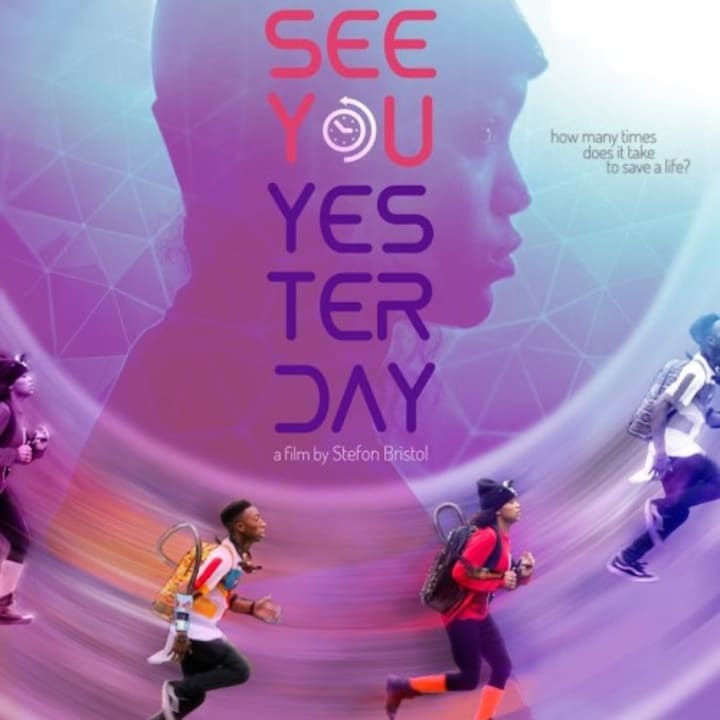
The promotional poster for See You Yesterday reads: "How many times does it take to save a life?"
As Jarbo said, in The Time Machine reboot, the hero repeatedly goes back in time to save his fiance from a shooting during a botched robbery attempt, but each time, something goes wrong. This is called determinism, which is more philosophy than physics—which makes it bollocks, in my book.
So here's the deal on why, the idea of the inability of time travel to save a person's life, is so much dumber than a box of rocks. It's simple: The physics that make time travel possible, in part, don't come from Einstein, but are derived from the 1957 thesis of Princeton's Hugh Everett, known as the Relative State Formulation, which is the source of the parallel universe idea. So on its face, the death of the main character's older brother in See You Yesterday didn't happen in all universes. There are some where he was never there, some where the cop never tried to shoot him and some where he wasn't stupid enough to pull out a cell phone when he was told to freeze—the number one item that makes nervous cops shoot someone. Like chumming for sharks.As a result, all you need to do is cause into existence (this is where information physics melds with quantum) a copy of one of the parallel universe pasts where he lived. However, here's another obvious problem that would effect both plots—Bristol's and any accurate scenario. The brother she finds in the past has a whole other family there which would include another version of her. That's right! I guess it wasn't so obvious for Bristol or Spike Lee. Gee, I guess all that time Spike spent hanging out with Ronald Mallett didn't rub off any time travel knowledge, or maybe that was the problem. More on that later...
So then what? Well, if the kids were as bright as advertised, they would've figured that out before they even tried their little adventure. And so it's like I've had to tell dozens of people from around the world who write me about how they want to go to the past and save someone or change this or that event. You have to modify your plan to adjust for the realities of time travel which aren't anything like the half-baked sci-fi crap that people think has any connection to the truth. Like the copies of everyone. Like you won't be younger when you go and there are no life do-overs as your younger self.
At 0:18 on the counter, Dante Crichlow's character says, "Maybe, no matter what we do, it will be the same outcome..." which really makes me feel for the kid—having to say such bad, time travel statements in this film.
YouTuber, Hang 'n' Swang posted a heads-up video on See You Tomorrow with a couple of interesting comments. One thing was that as he watches the film's trailer, it hit me that something was wrong. At 1:04 on the counter, Dante Crichlow states, "This is something Einstein spent his entire life trying to do..." NO! HE DIDN'T! When confronted with the possibility of closed time-like curves, those mathematical geometries that many physicists like to call "time machines," as found in his theory of General Relativity by mathematician and friend, Kurt Godel, Einstein replied in part, “Kurt Gödel’s essay constitutes, in my opinion, an important contribution to the general theory of relativity, especially to the analysis of the concept of time. The problem here involved disturbed me (emphasis mine) already at the time of the building up of the general theory of relativity, without my having succeeded in clarifying it."
So clearly, time travel hadn't even been on Einstein's mind—let alone what he had worked on his frickin' entire life! This is exactly what I'm talking about. Stefon Bristol's going to make some big deal about the social message of his flick, and be sure that he has these super smart, African American kids in it and then he's too stupid to do some basic research on this subject that he's pilfering to use as a plot device—to the point that his "smart kids" in the flick are stating false facts which will in turn mislead real kids he's trying to inspire and makes his characters look stupid to truly smart kids. Smart kids like the ones that know how to research a topic before writing about it.
If you don't think that's a big deal, consider the fact that both Bristol and the media have stressed the kids being "geniuses" in the film. For example, Jonathon McDougle tweeted in part that See You Yesterday is "a film about two young black geniuses who invent time travel." Meanwhile, CBS News tweeted that "director Stefon Bristol told CBSN his film is not just about 'police brutality.' 'It's about STEM research and kids trying to figure out their lives in science. I want that to be an inspiration for real youth in the hood.'" Too bad Bristol didn't do his own homework before having the kids say stupid things—easily checked to be untrue or misleading. But this is indicative, overall, of what writers of time travel sci-fi have been doing all along. Think they can just slap whatever they want together, using their own erroneous logic about time and time travel, which proves they know nothing about quantum mechanics either.
Vladimir Duthiers, another CBS news correspondent, stated in a tweet, "We spoke w/ @stefonbristol & @missezbrando the filmmakers behind @Netflix's #SeeYouYesterday. They wanted to 'emphasize' the film's young black protagonists were into science, math, and college. 'It's really important for us to show this aspect of what our young people are doing.'" Yeah right. Getting physics history wrong. Very wrong. Which brings up the point that Bristol's co-writer is one F. Bailey (AKA @missezbrando) just might deserve a good portion of the blame that I'm slinging at Bristol. After all, Bristol turned to her to be the writer that would handle things he couldn't. In any case, Bristol was in charge as director, so the buck stops with him.
Maybe, I'm extra bent outta shape about that aspect because I have done award-winning STEM projects with urban school kids before, proving J. Robert Oppenheimer correct about children being able to use sensory perceptions that he lost "long ago" to see solutions to advanced physics problems. The students were given real-world problems that people like Stephen Hawking got wrong and they were able to figure out the solutions. I even presented a published paper in the proceedings at the 2014 100 Year Starship Symposium on it, as part of why grade school kids are ready for space education.
Proclamation Bexley Students and I Received for Proving Stephen Hawking Wrong...
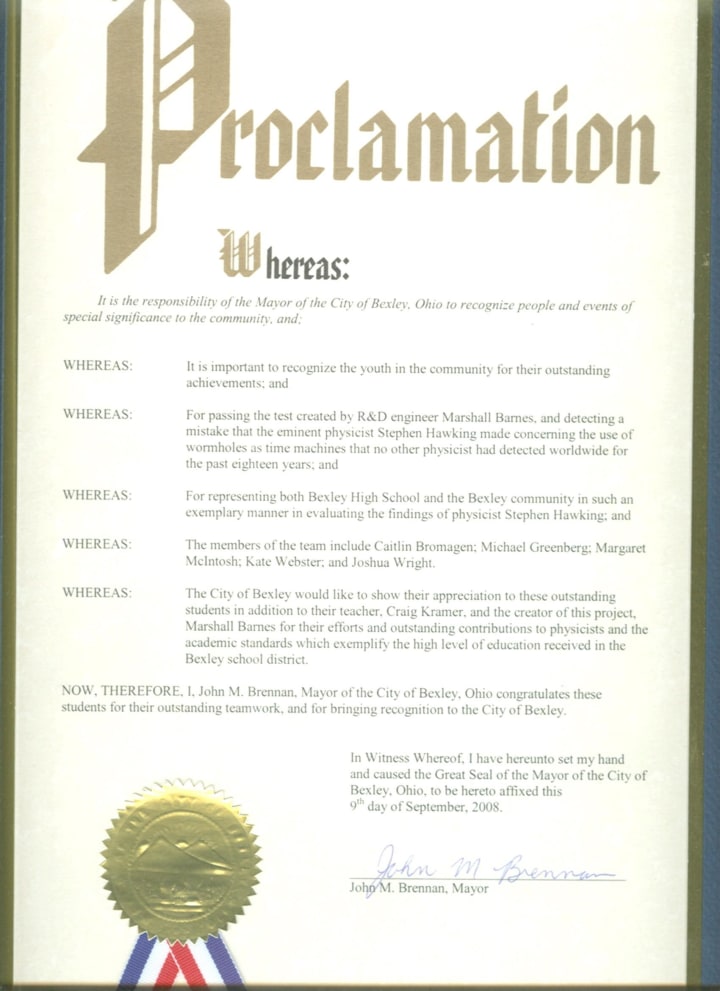
Photo from That Bexley Ceremony...
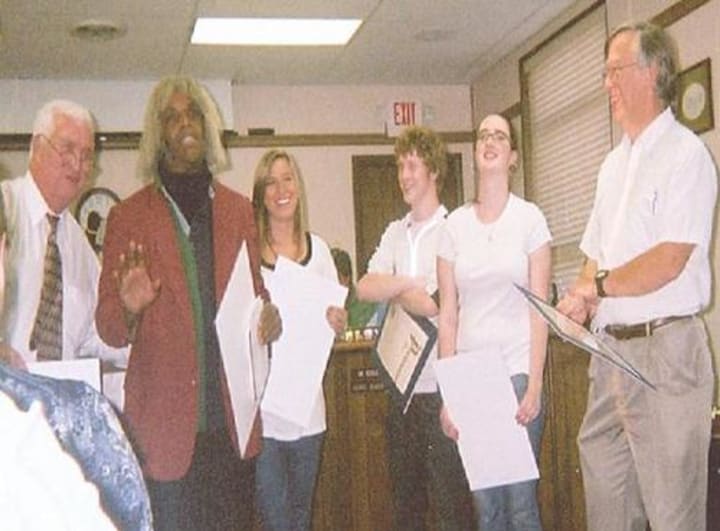
"So then Hawking says the wormhole connection gets destroyed when the spacecraft is 10 lightyears away, but it's not going FTL, so can never reach 10 light years away!"
So, I was duly nonplussed when I saw, in a review for The Observer by Danielle Scruggs, that one of the "Easter eggs" in the film is a scene where someone is reading Stephen Hawking's A Brief History of Time. The nature of time and time travel were Stephen Hawking's worst subjects, where he made the majority of the mistakes in his career. To get a quick understanding of how overrated he was, just get a copy of that book and read on the back cover the accolades and predictions about what he would do in the future beyond 1988. He accomplished not a single one of those things in his lifetime. None. I know. I wrote the most authoritative book on his work and image—Space Warps and Time Tunnels: The Infamous Legacy of One Stephen W. Hawking and I was the only person in the world that said he would be wrong about the Higgs Boson when he went public against it in 2008. In case you've forgotten, Hawking was wrong, admitting he lost a much earlier, private bet with Gordon Kane of the University of Michigan.
Elementary Students—Who Proved Hawking's "Mad Scientist Paradox" Wrong—and I Get Proclamations of Recognition From the Ohio House of Representatives
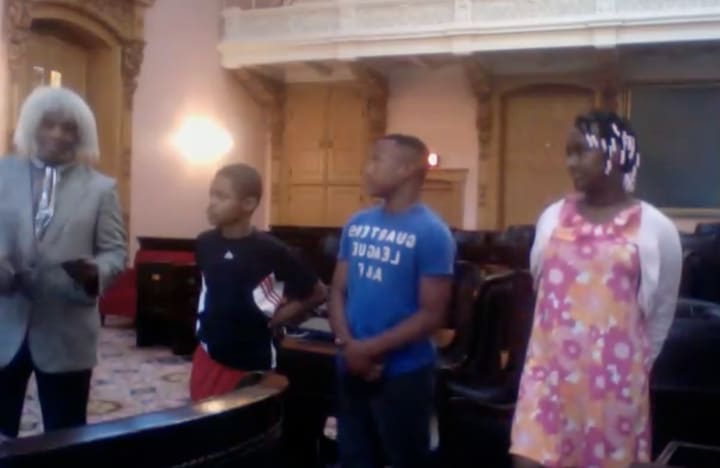
The Proclamation of Recognition That I Received Above
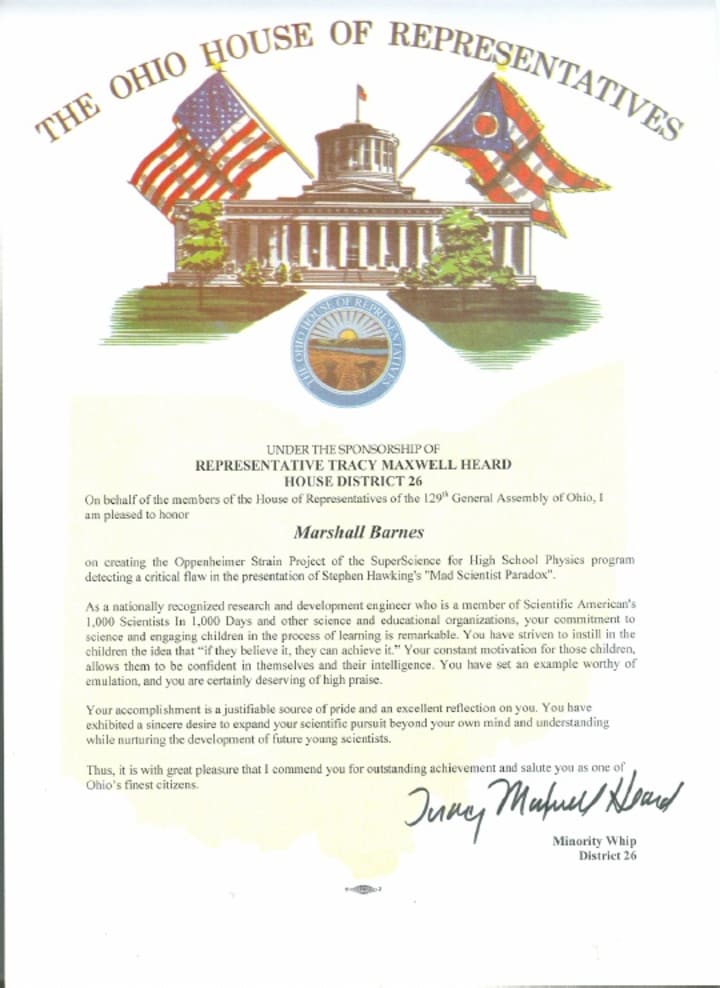
Another thing that Scruggs brings to attention, though she doesn't appear to realize the significance of it, is how incredibly naive these "brilliant" students are portrayed to be. Scruggs notes that "When they realize the potential of what they've created, CJ sees the opportunity to get a full ride to one of their dream schools—MIT, Morehouse or Spelman. The two teens work tirelessly in Sebastian's garage to put the finishing touches on their machines in time for a science expo."
Are you kidding me? They never realized the potential of what they created or they wouldn't have been thinking about what colleges it would get them into. If they're clueless enough to show off their tech at a science expo then they have no idea how fast DARPA, the DIA, NASA and Homeland Security would be descending on them. The resulting scenarios, I'll leave to your imagination. I know what they are...
At 3:58 in the above video, Hang 'n' Swang asks, "Is the government up to something? Are they working on some time traveling device that we need to be aware of?" No. I am. That's correct. As an internationally noted, quantum physics trained, advanced concept science, and technology R&D engineer in real life (unlike Malcom Barrett who pretended, just because he played such a character on NBC's Timeless, that he could front like one for real) I am an active and highly motivated member of a collection of physicists and other researchers, heavily involved in time travel research at various levels and we're making progress. I anticipate, at least in my case, getting additional funding soon from Silicon Valley.
Which brings me to Spike Lee and his relationship with Ronald L. Mallett of the University of Connecticut. Long story short, Lee bought the rights to Mallett's story with the intent of hyping it as some kind of 'son's love of a lost father propels him to pursue a career in theoretical physics in order to build a time machine and go back in time to save his life', which has been the hyped narrative in dozens of media stories and interviews. The only problem is that Mallett has turned out to be a liar, fraud, and con man who has never written a single paper on time travel science, or made any serious effort to finance the building of the time machine that he claims to have designed. Furthermore, he joined forces with Scott J. Cooper in an apparent attempt to defraud investors to the tune of one half billion dollars and broke Florida laws against advertisements designed to sell anything—containing false statements, in the process. If Scott Cooper's name sounds familiar, he was the CEO of World Patent Marketing which was shut down by the FTC for fraud, etc. This resulting in the media maligning Mallett's research for the first time, in their attempt to make their main target, Matthew Whitaker, then acting Attorney General appointed by President Trump, look bad. It also cost Mallett a major financial ally in Cooper and his potential source of funds.
I warned Spike in an open letter that Mallett was bad news, and as a result, his idea of making Mallett some kind of a hero was now impossible, and that was before the Whitaker/WPM scandal broke. To make matters even worse, I have now been able prove conclusively that Mallett's time machine design is a crock and he's nowhere near being a time travel scientist, though he's still been able to fool some people (especially scientists in Europe, mostly Germany/Austria). I did so by taking the 1997 published proposal by Rainer Plaga, on the ability to detect parallel universes, (something that Mallett said would not be possible until the first time machine is built), and linked it to the possibility of time travel due to already established work on retrocausality. I even used lasers to do it—the same instrument that Mallett has been famous for using in his faulty design. The results are laser pulse hits that appear out of nowhere—without cause. Why? Because they're the result of pulses fired nano seconds earlier in the prior parallel universe. This fit well within predictions of the Relative State Formalism and Rainer Plaga's proposal published in the Foundations of Physics. As far as time machines go, the one I'm developing now combines these aspects with conceptual, non-relativistic versions from the 1992 theoretical suggestion of American Medal of Science award winner, Yakir Aharonov.
This solidifies that there is no validity to any claims of Mallett being brilliant, of having a time travel breakthrough, or that he is, in fact, atime travel scientist.
Rock solid evidence of Ronald Mallett breaking Florida law, by promoting the World Patent Marketing video featuring Time Travel X, on Twitter. Part of the evidence that was compelling enough for the Florida Attorney General’s office to forward my report to the FTC.
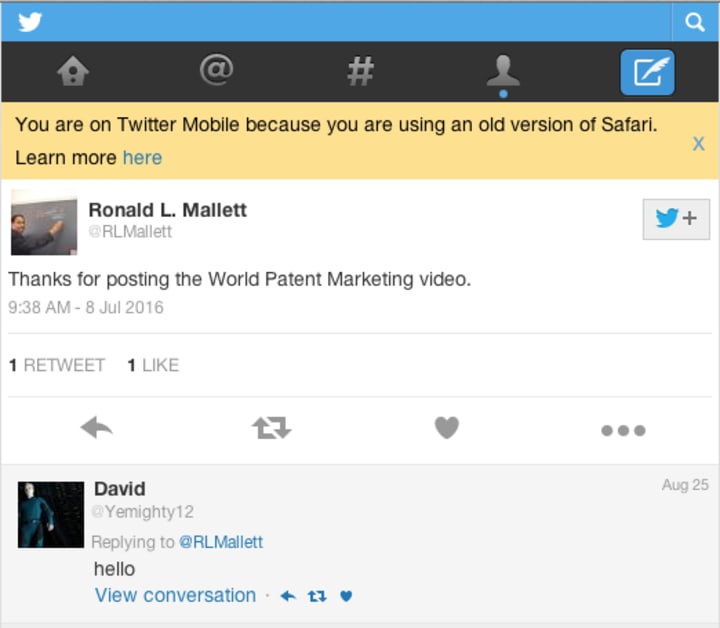
This tweet, directly from Ronald Mallett, breaks Florida law 817.06 from their Revised Code.
Irrespective of the message or intent of this film, as happens far too often, there appears so far nothing of value that is suggested—as to what can be done in reality to stop these kinds of shootings. Nope. Just the hapless mantra of "where is the justice?" which turns the whole affair into such a pathetic pantomime that is so indicative of the current culture between the police and black community.
So, in effect, the information regarding time travel science is wrong, the relationship to Einstein is wrong, and there's precious little here that shows what to do about the problem that is the film's central theme. That's three major flaws in this flick and as they say: Three strikes and you're OUT! So, for those very reasons, I say Bristol has struck out with this film. But, there always the low information public that may buy into it, nonetheless. And there's always a next time and he can certainly learn from his mistakes. The real question is, can Spike Lee do the same and avoid any further involvement with promoting that lying, con man, Ronald Mallett?
Perhaps when my new book on Mallett, It Was A Matter Of Time, hits the streets in time for the summer reading season, Spike will be clear on how to do the right thing.
Cover Art for My Upcoming Book on Ronald Mallett
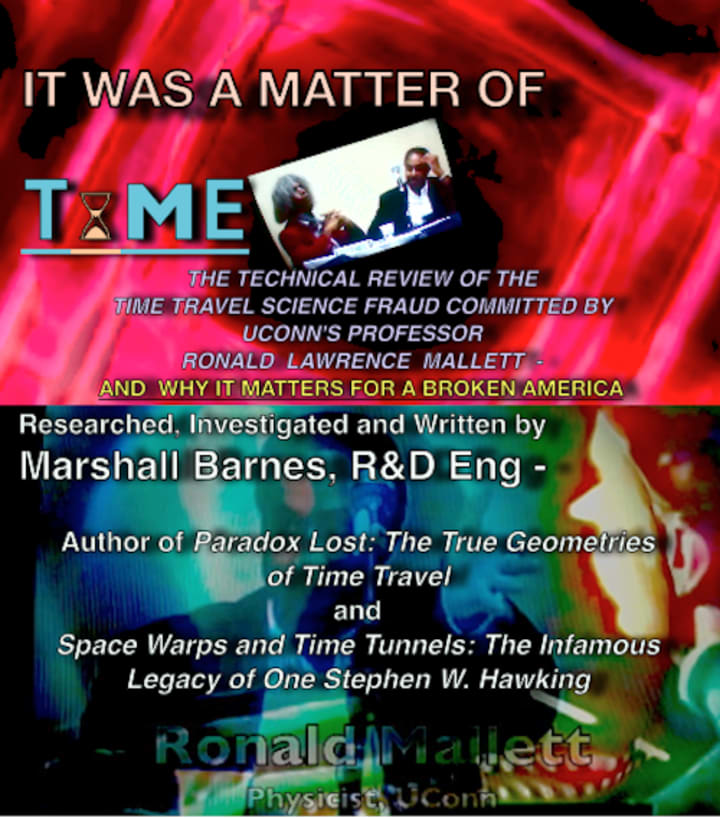
About the Creator
Marshall Barnes
The
internationally
noted
R&D
engineer
and
conceptual
theorist






Comments
There are no comments for this story
Be the first to respond and start the conversation.